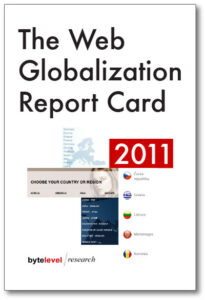
Who’s at the top and why it’s not a big shocker:
“The Social Network” may soon be declared best picture of the year, so it’s no surprise that Facebook is #1 on the list of 250 sites, unseating international powerhouse Google. Facebook has expanded rapidly into new markets, mainly using crowdsourcing to translate their site into nearly 100 languages (including Pirate). El numero uno has also introduced some innovations such as multilingual social plug-ins to propel them into the top spot. Aside from Facebook and Google, the top ten consists of global corporations such as Cisco, 3M and Samsung. LG surged ahead in one short year from #21 to #5. Those sites ousted from the top ten versus last year’s evaluation: Wikipedia and Lenovo.
Special kudos to….
Acclaro clients: Amway, Cisco, Oracle, SAP, Sony, Visa, and Yahoo!.
How the scorecard is created
One very dedicated person, John Yunker, editor of Global By Design, personally reviews hundreds of website and rates each one on:
- Global reach (languages)
- Global navigation
- Global consistency
- Localization
- Community localization
Why a great global website matters
A great global website — from the back end code (did you know you need multi-byte characters to support non-Roman characters such as Arabic, Chinese and Korean?), to the localized search engine marketing campaign driving eyeballs to the site, to the multilingual navigation, to the culturally-acceptable images, to the actual website translation — makes visitors see your company as someone who cares about them as a potential customer. If your site makes it difficult to find the appropriate language, or if it has incorrect translation, or it has an offensive image, visitors will more than likely seek out a competitor who has taken the time to create a site that specifically caters to an international market.
Why go niche within a global site
You may want to follow Facebook’s and Google’s example and have smaller niche/obscure languages and/or language “flavors” (e.g. Spanish for Peru or French for Switzerland) available on your website if that makes sense for your business plan. Don’t assume a site in French for France will have the same impact for Canadian French speakers in Quebec. Nor should you assume that a site in Spanish, created for website visitors in Spain, will work well across Latin America. Making informed decisions about each local market will make your global website that much more effective and drive dollars (or euros or pesos for that matter) to your business.
Insights for global growth






Power your strategic growth
Go beyond tactical localization with tailored, strategic solutions that resonate locally and drive growth globally.
Get started
